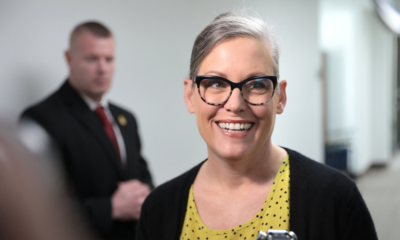agencies
Critics Demand Veto of Utility Measure If It Reaches Hobbs’ Desk

**Key Points:**
Bill would allow utility companies to move debt into low-interest bonds.
Critics say the process can be beneficial, but lacks necessary safeguards for residential utility customers.
Utility companies assert it will save customers money over time.
Democratic lawmakers and advocates are raising concerns over a bill that permits public utility companies to securitize assets, with a potential veto from Governor Katie Hobbs looming. During a press conference on April 29, Senators Priya Sundareshan and Lauren Kuby, alongside former commissioners Sandra Kennedy and Bob Burns, urged Hobbs to refuse House Bill 2679. This legislation enables utility firms to convert debt into low-interest bonds to fund aging infrastructure, including outdated coal-fired power plants.
Since its introduction in January, the bill has sparked bipartisan discussions. Its provisions have raised alarms among both Republicans and Democrats, especially after the Arizona Corporation Commission (ACC) claimed a lack of consultation from Arizona Public Service (APS) and Rep. Gail Griffin, who sponsored the bill. Presently, the ACC maintains a neutral stance, even as the bill advanced through amendments in the House. Critics highlight that the bill does not provide adequate oversight, risking the securitization of assets that may not benefit ratepayers.
Former commissioner Kennedy criticized the bill as a “Ponzi scheme,” stating, “Older debts are paid off with new charges, locking ratepayers into decades of payments while ensuring profits for utility companies and leaving struggling consumers to cover the costs.” Despite a letter from the all-Republican ACC outlining their concerns, APS and Republican supporters promote the bill as a cost-saving measure. The legislation is now awaiting further amendments in the Senate before heading to the Governor.
Burns, a former Republican commissioner, stressed the importance of conducting an evidentiary hearing on the bill, calling for a veto if it reaches the Governor’s desk. He stated, “It needs thorough investigation with a critical eye before passing, as it could harm many who depend on APS.”
While Hobbs’ office declined to comment on the bill, Sundareshan has voiced her concerns with the Governor’s staff, suggesting amendments to limit securitization strictly to retiring infrastructure. However, APS rejected those proposals but is working with Republicans on other changes.
Opponents of the bill believe that while securitization can be beneficial, the current proposal is rushed and potentially unconstitutional. Attorney General Kris Mayes warned that the bill could infringe upon the constitutional authority of the ACC to set utility rates, risking legal challenges if the legislation is enacted without modifications.
Some Democratic representatives, including Seth Blattman and Janeen Connolly, have co-sponsored the bill, potentially influencing Hobbs’ decision. Sundareshan expressed concern that some Democrats may not fully understand the 40-page bill’s complexities. She is actively working to inform her colleagues about its implications.
“There was not a lot of transparency or stakeholder input,” Sundareshan noted. “When it comes back to the Senate, we will definitely discuss the dangers it poses.”
As the Senate deliberates on potential amendments, critics remain vigilant, unsure if their concerns will be addressed or if they will ultimately need to escalate their opposition to the Governor.


















